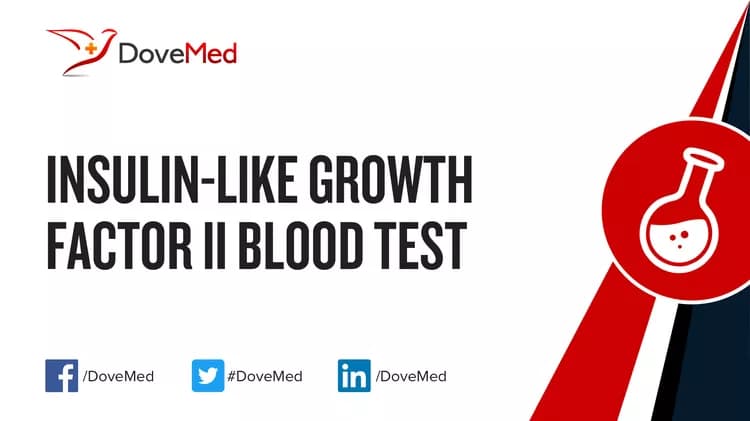What are other Names for this Test? (Equivalent Terms)
- IGF-II Blood Test
What is Insulin-Like Growth Factor-II Blood Test? (Background Information)
- Insulin-like growth factor-II (IGF-II) is a hormone produced by the liver that is thought to influence growth hormone levels. It is structurally similar to insulin-like growth factor-I (IGF-I) and proinsulin
- Growth hormone (GH) promotes development from birth to puberty. It is also essential for the maintenance of metabolism, skeletal muscle, and bone tissue throughout life
- The pituitary gland, located at the base of the brain, releases growth hormone in periodic bursts. Most GH is released during deep sleep. GH affects nearly every cell in the body. It causes cells to increase their protein production and their fatty acid metabolism
- The growth-inducing effects of growth hormone are important for adaptation to strenuous demands, such as exercise. GH also stimulates the replenishment of tissues during everyday wear and tear. The hormone is especially important during childhood development
- Problems with the pituitary gland or growth hormone-releasing hormone (GH-RH) may cause underproduction of the growth hormone. This results in stunted growth, abnormal fat distribution, and difficulty regulating blood sugar
- Excessive production of growth hormone, caused by tumors or problems with the regulatory mechanisms, may cause excessive growth. The resulting conditions, though similar, differ depending on the stage of life that a GH overproduction occurred:
- Growth hormone overproduction before puberty results in gigantism. This is marked by extreme lengthening of the skeleton, sometimes causing heights in excess of 8 feet
- Growth hormone overproduction during adulthood results in acromegaly. Because the bones have already reached their maximum length, acromegaly is marked by bone thickening but not bone lengthening
- The vast majority (95%) of IGF-II circulates through the bloodstream bound to a carrier protein. Adequate nutrition and growth hormone levels influence the levels of IGF-II in blood
- The Insulin-Like Growth Factor-II Blood Test helps determine the levels of IGF-II in blood. It helps diagnose growth hormone-related disorders and hormone-secreting tumors
What are the Clinical Indications for performing the Insulin-Like Growth Factor-II Blood Test?
Following are the clinical indications for performing the Insulin-Like Growth Factor-II Blood Test:
- Following up to a high lipids test result
- Abnormal development during childhood
- Delayed sexual maturity
- Fatigue
- Easy bone fractures
How is the Specimen Collected for Insulin-Like Growth Factor-II Blood Test?
Following is the specimen collection process for Insulin-Like Growth Factor-II Blood Test:
Sample required: Blood
Process of obtaining a blood sample in adults:
- A band is wrapped around the arm, 3-4 inches above the collection site (superficial vein that lies within the elbow pit)
- The site is cleaned with 70% alcohol in an outward spiral, away from the zone of needle insertion
- The needle cap is removed and is held in line with the vein, pulling the skin tight
- With a small and quick thrust, the vein is penetrated using the needle
- The required amount of blood sample is collected by pulling the plunger of the syringe out slowly
- The wrap band is removed, gauze is placed on the collection site, and the needle is removed
- The blood is immediately transferred into the blood container, which has the appropriate preservative/clot activator/anti-coagulant
- The syringe and the needle are disposed into the appropriate “sharp container” for safe and hygienic disposal
Preparation required: No special preparation is needed prior to the test.
What is the Significance of the Insulin-Like Growth Factor-II Blood Test Result?
The value for the Insulin-Like Growth Factor-II Blood Test is interpreted based on an individual’s age, as follows:
- Prepubertal child: 334-642 ng/mL
- Pubertal child: 245-737 ng/mL
- Adult: 288-736 ng/mL
The significance of the Insulin-Like Growth Factor-II Blood Test result is explained.
- A high value for the test may indicate:
- Hypoglycemia
- Hepatoma
- Wilms tumor
- A low value for the test may indicate GH deficiency
The laboratory test results are NOT to be interpreted as results of a "stand-alone" test. The test results have to be interpreted after correlating with suitable clinical findings and additional supplemental tests/information. Your healthcare providers will explain the meaning of your tests results, based on the overall clinical scenario.
Additional and Relevant Useful Information:
Certain medications that you may be currently taking may influence the outcome of the test. Hence, it is important to inform your healthcare provider, the complete list of medications (including any herbal supplements) you are currently taking. This will help the healthcare provider interpret your test results more accurately and avoid unnecessary chances of a misdiagnosis.
What are some Useful Resources for Additional Information?
The following DoveMed website link is a useful resource for additional information:
https://www.dovemed.com/common-procedures/procedures-laboratory/igf-1-test/
Please visit our Laboratory Procedures Center for more physician-approved health information:
http://www.dovemed.com/common-procedures/procedures-laboratory/
Related Articles
Test Your Knowledge
Asked by users
Related Centers
Related Specialties
Related Physicians
Related Procedures
Related Resources
Join DoveHubs
and connect with fellow professionals


0 Comments
Please log in to post a comment.